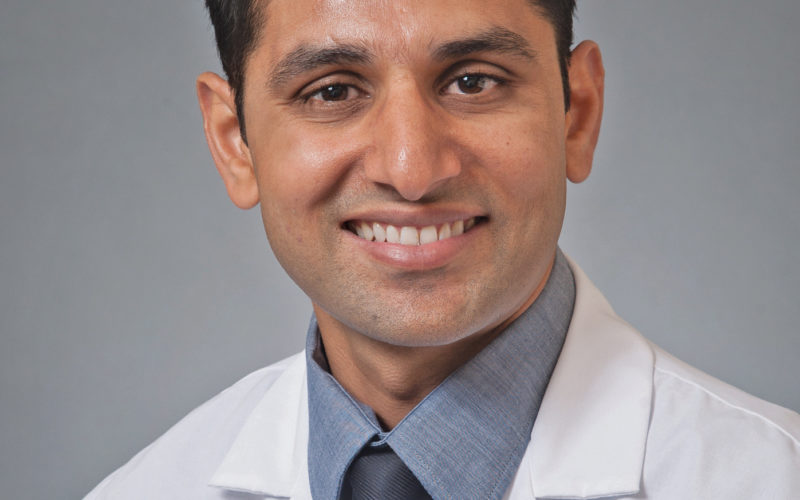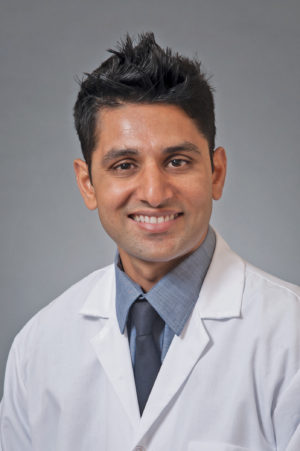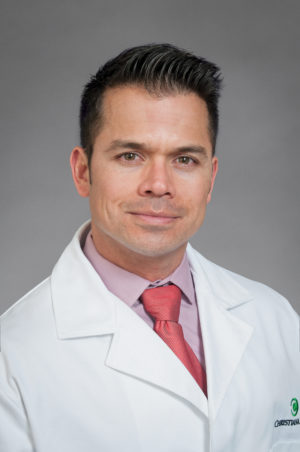Interventional pulmonology opens up new treatment possibilities
New service at Christiana Care provides minimally invasive procedures to diagnose and treat lung disease


Dave McFadden knew it was time to see his doctor when he became winded just walking up a flight of stairs.
“I couldn’t do anything without becoming short of breath,” said McFadden, 59, of Wilmington. An avid sailor who led an active life, he had been diagnosed with colon cancer two years ago but had never had a problem with his lungs.
He didn’t know that his left lung was collapsing, and time was of the essence in order to save it.
Fortunately, his oncologist, Pamela S. Simpson, M.D., suspected just what was going on. She also knew that Christiana Care is the only health system from Philadelphia to Baltimore to offer the specialty service that would enable him to quickly regain his quality of life.
She referred McFadden to Haroon M. Raja, M.D., medical director of Bronchoscopy for Christiana Care. He and Ismael A. Matus, M.D., FCCP, director of Interventional Pulmonology, provide care in a new field of pulmonary medicine that employs minimally invasive procedures to diagnose, treat and alleviate symptoms for patients with a variety of lung diseases.
Drs. Raja and Matus conducted a bronchoscopy to examine McFadden’s airway and detected a tumor that had metastasized from his colon cancer. The mass was blocking his left airway, causing his shortness of breath and endangering his lung. At a second appointment, McFadden underwent general anesthesia, and the two physicians removed the tumor. McFadden went home the same day.

“I felt fine afterward, and within 24 hours my breathing got a whole lot better,” McFadden said. “I felt like myself again.”
He was especially thankful when he learned that waiting a few weeks longer might have been detrimental.
“Dr. Raja and Dr. Matus did a great job,” he said. “They were very patient-oriented and explained everything very well before the procedure.”
Dr. Raja said that McFadden’s case demonstrates how interventional pulmonology is improving the lives and outcomes for people with such conditions as pulmonary nodules, lung cancer, cancer of the airways, benign airways disease, pleural disease and complicated asthma.
“He came in with a tumor in the main airway leading to his left lung. In the past it would be unlikely that he would’ve had options, and his left lung would be lost. We were able to rescue his entire left lung from impending total collapse by resecting his airway tumor,” Dr. Raja said.
Not only is Christiana Care’s Interventional Pulmonology Program the first in the state, it is the only one in the region that offers novel minimally invasive diagnostic and therapeutic procedures.
“We manage cancers of the airways, lungs and pleura through our multidisciplinary collaboration with other specialties,” Dr. Raja said.
To do so, the interventional pulmonology specialists work closely with thoracic surgeons, medical oncologists and radiation oncologists to offer best diagnostic and treatment plans and deliver best-possible outcomes and positive patient experiences.
The minimally invasive procedures may add years to patients’ active lives and, by doing so, may reduce the cost of treating lung disease.
Located on the Christiana Hospital campus in Newark, interventional pulmonologists offer advanced diagnostic bronchoscopy for patients with abnormal imaging findings as well as therapeutic bronchoscopy and medical thoracoscopy for complex airways disease and pleural diseases, respectively.
The field improves patient outcomes on a number of fronts, Dr. Matus said. From a diagnostic standpoint it provides a more minimally invasive approach to other traditional invasive testing in both diagnosing and determining the stage of malignancies. From a therapeutic perspective, interventional pulmonology offers treatment options that can provide safe and immediate symptomatic relief, which improves patients’ quality of life and functional status, allowing them to be considered candidates for more definitive treatments such as chemotherapy and radiation therapy.
“Most procedures are performed on an outpatient basis, and they are better tolerated by our patients,” Dr. Matus said. “So, we are talking improved quality of life for most patients and potentially prolonging survival for some.”